Aug 19, 2025 – Advisory Committee Meeting of Dungji Foundation, Meeting with JTS Bhutan Volunteers
Hello. Today, Sunim was scheduled to attend the advisory committee meeting of Dungji Foundation, an NGO that supports overseas Korean adoptees.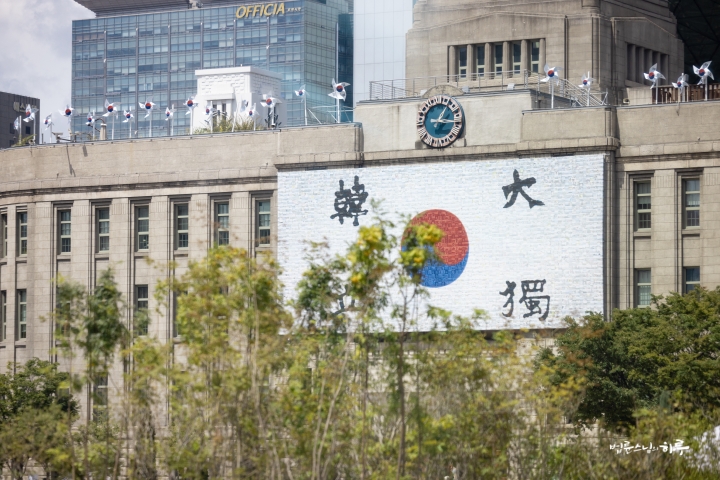
After completing morning practice and meditation, Sunim worked indoors in the morning. After reviewing the overseas schedule from late August to mid-October, he had lunch.
At 1 PM, at the request of Father Kim Hong-jin, Sunim headed to Mugyo-dong, Jung-gu, Seoul to attend the advisory committee meeting of Dungji Foundation.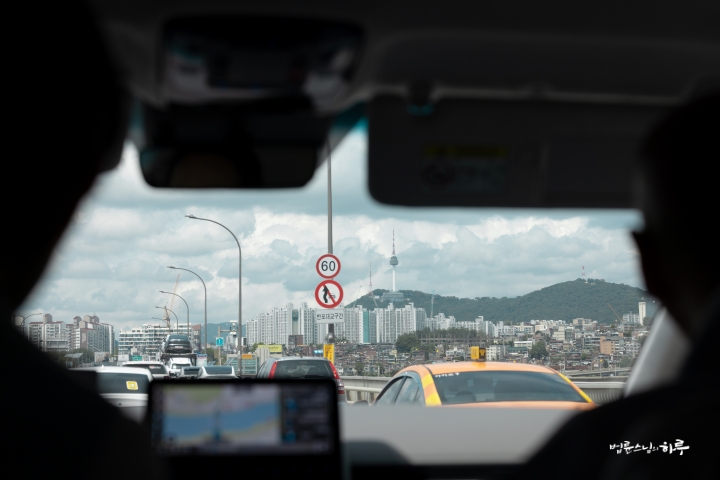
Dungji Foundation was established in 2006 to support overseas Korean adoptees who grew up away from Korea by providing Korean language education, cultural experiences, family searches, and job placement services. Since Father Kim Hong-jin serves as the chairman and actively leads the organization, Sunim gladly accepted the request to attend the meeting and provide advice.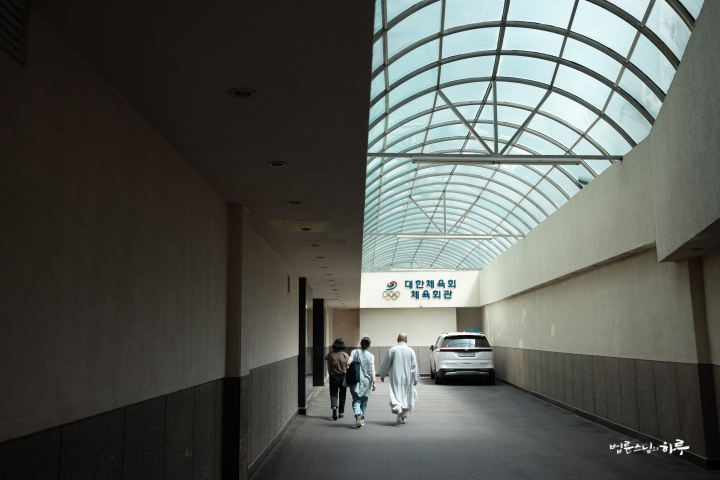
Thanks to arriving earlier than the scheduled time, Sunim had tea and conversed with Bishop Kang U-il, who had arrived first. Bishop Kang U-il served as the president of Catholic University of Korea and the bishop of the Catholic Diocese of Jeju, and had long assisted Cardinal Kim Sou-hwan. As one of the most respected figures in the Catholic Church, Sunim had invited him to several important gatherings of social elders, but he couldn’t attend due to residing in Jeju Island. Sunim warmly greeted him and engaged in conversation with Bishop Kang.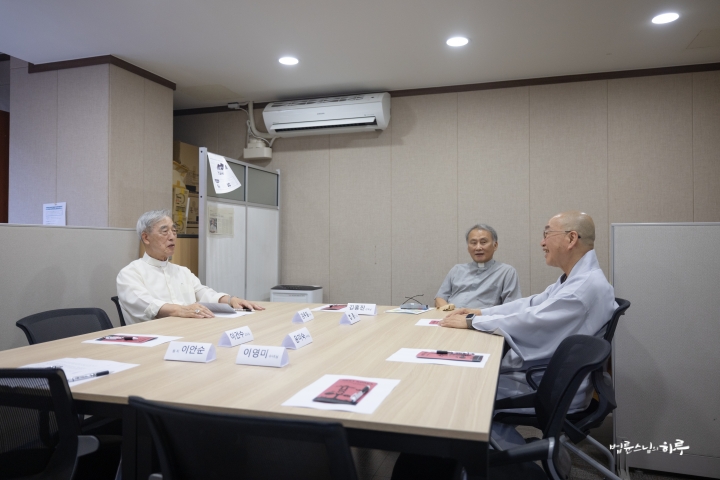
“Sunim, you were really busy when you were working on the movement to help North Korean compatriots, and you’re still busy now, aren’t you?”
“Yes. When I first started the movement to help North Korean compatriots in the mid-1990s, I thought it would be resolved in just three years, but I never imagined it would remain unresolved for 30 years like this. At that time, we served Cardinal Kim Sou-hwan, Reverend Kang Won-ryong, and Venerable Song Wol-ju as our elders, while Pastor Kim Myung-hyuk, Father Oh Tae-soon, and I handled the practical work. Since then, Father Kim Hong-jin has been at the center, continuing exchanges to this day.” 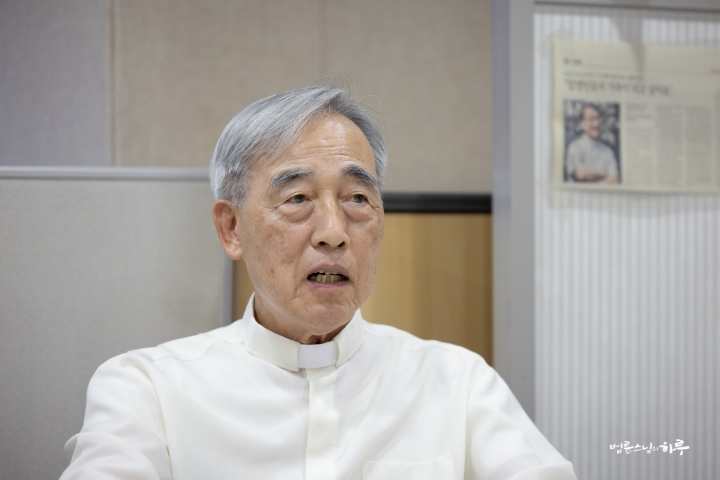
“Since you’re healthy, Sunim, you’re still doing many activities.”
“It’s thanks to my childhood experiences of farming and eating kudzu roots to survive. I ran all over the mountains herding cattle and walked long distances to school. I had no choice because of poverty, but looking back, it was a blessing. When I go to Southeast Asia to help poor people, my rural upbringing is a great help. The situation is similar to what I experienced 50 years ago, so I can communicate without any barriers just by sharing what I know. In fact, the local youth interpreters often know less about village circumstances than I do.” (laughter) 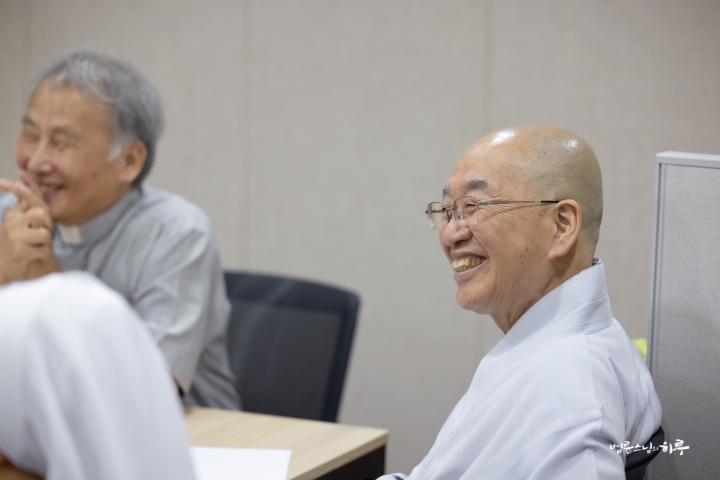
As they exchanged greetings, it was time to begin the meeting.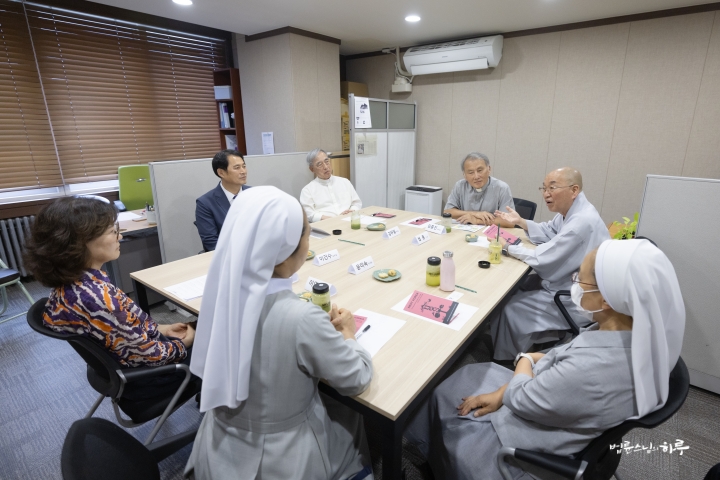
Once all the advisory committee members had arrived, the Doongji Advisory Committee meeting began at exactly 2 PM. This meeting was an opportunity to discuss together what path Doongji, which helps overseas adoptees, should take going forward. First, Father Kim Hong-jin, who serves as the chairman of Doongji, gave opening remarks.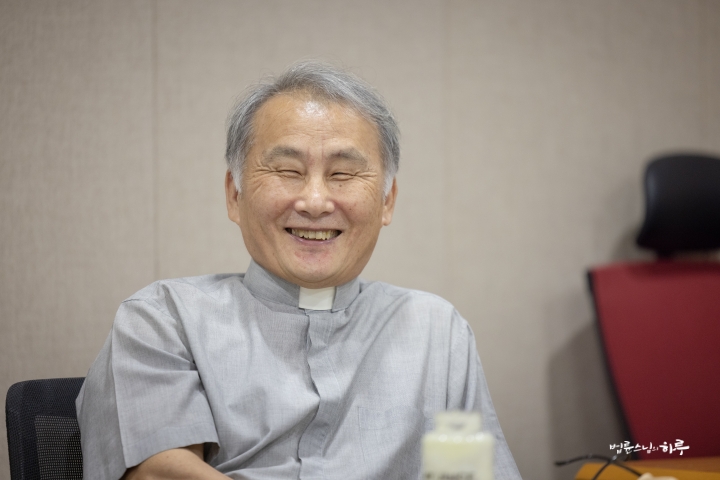
“Until now, adoptees who wanted to meet their parents had to individually search for the adoption agencies that sent them abroad. There were many unfair and non-transparent issues in this process. So the government created a law to unify all information, and starting September 15th, the National Center for the Rights of the Child will serve as the central contact point. Our organization, Doongji, has been designated as an agency to facilitate these reunions. Facing such significant changes, we’ve arranged this meeting today to seek advice on how Doongji can expand its reach and play a more substantial role.”
After discussing the challenges Doongji faces with the implementation of the new system and greater responsibilities, Sunim and other advisory committee members provided generous advice.
Overseas Adoptees’ Birth Parent Reunions: System Changes and New Challenges
Director Lee An-soon of Doongji candidly shared the limitations and difficulties she feels in the process of facilitating birth family reunions.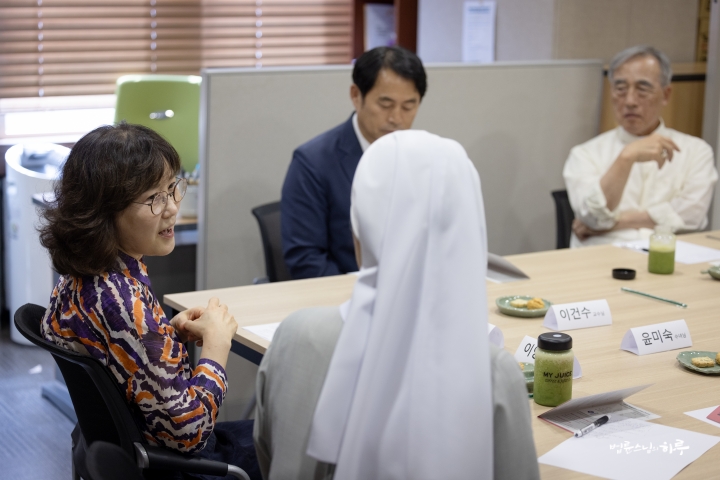
“Recently, there have been many cases where birth parents make financial demands of adoptees after meeting them. When faced with an adoptee’s resentment saying ‘You’re the one who abandoned me,’ I don’t know how to respond and my heart races. After listening to their stories wholeheartedly for two or three hours, I’m so drained that my body trembles. I’m confused about whether I should continue this work and how far I should intervene.”
Director Lee’s confession carried the weight of bearing people’s pain and wounds together with them. Sunim advised her to take a step back and observe the situation.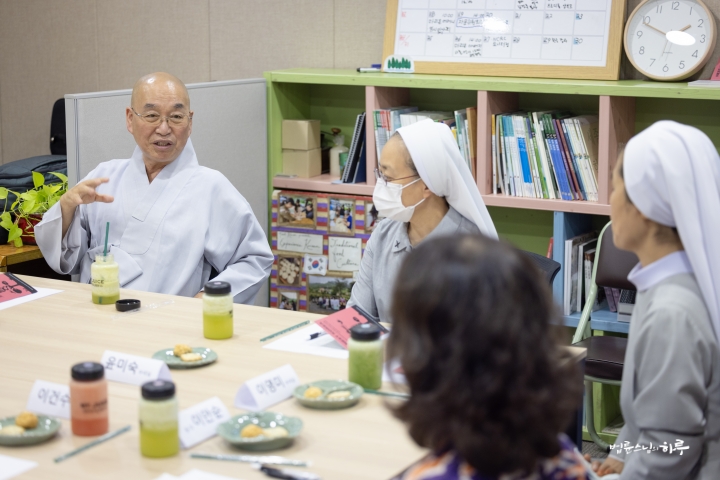
“They may be called parent and child, but how can people who meet after 20 or 30 years communicate overnight? Just find meaning in the meeting itself. If nothing special happens after one meeting, it’s fine to end it there, and if they want to continue, they can.”
Sunim also gave advice about the emotional burnout felt in the field.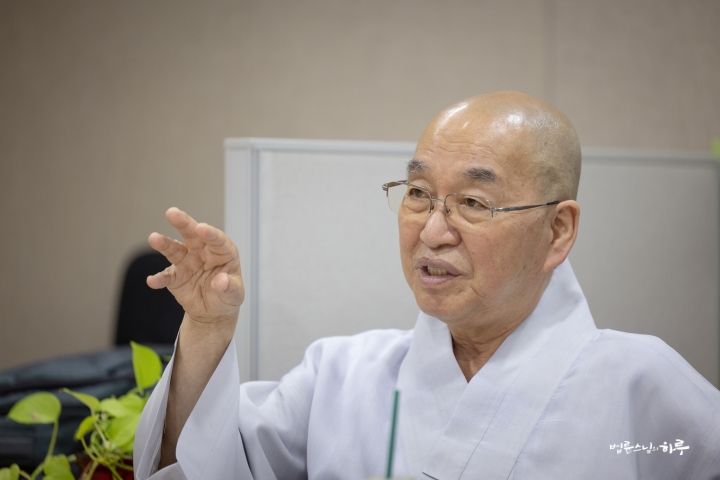
“When you listen to adoptees’ sad stories, their emotions transfer directly to you and tears come to your eyes too. But if counselors or helpers get absorbed in that, they cannot sustain this work. Don’t judge morally, but step back with the mindset of ‘there are people like this too.'”
Sister Yoon Mi-sook from the Holy Family Adoption Center pointed out the confusion in the recently changed adoption system.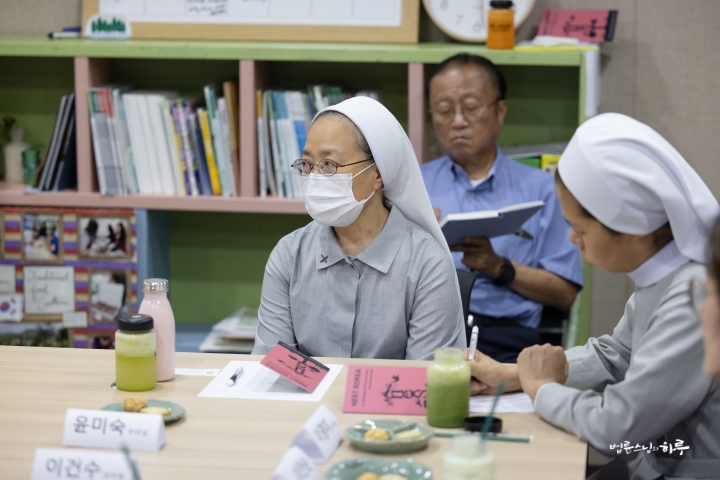
“The new system is operated centered on local governments, but there are many loopholes. Child facilities nationwide are experiencing a sharp decline in the number of children due to falling birth rates, and adoption procedures have become more complex. Nevertheless, based on the experience and resources we’ve accumulated so far, we must take good care of the children and find new support methods for adoptees.”
Professor Lee Geon-soo from the Department of Police Science at Baekseok University emphasized focusing on the essence of reunion facilitation.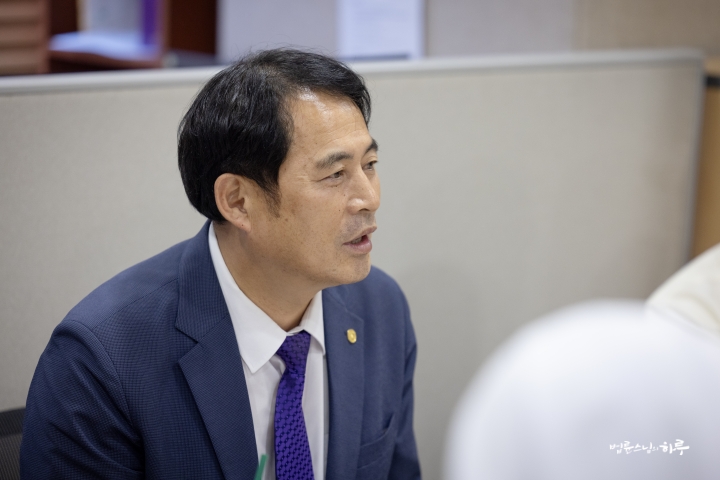
“The meeting between parents and children is precious in itself, more than elaborate preparations. It’s enough to just provide the time and place. There’s no need to share all the facts at once; it’s better to share information only as needed. And above all, we need a specialized center operated jointly by the public and private sectors at the national level.”
Sister Lee Young-mi shared her experiences teaching Korean to overseas adoptees.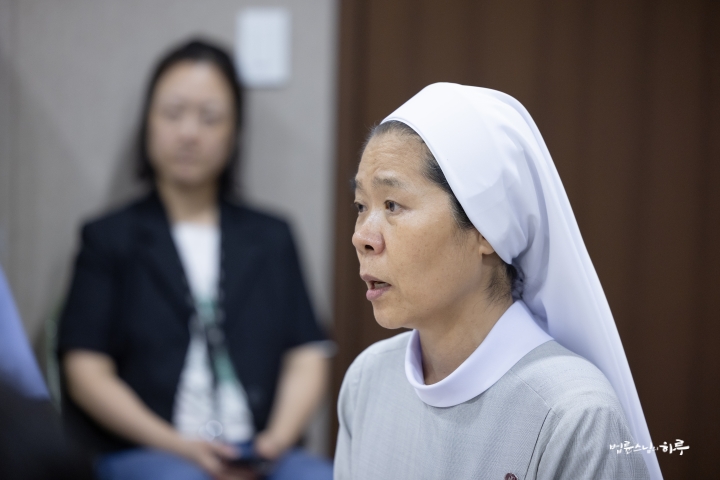
“Even when adoptees meet their parents, they feel so frustrated when they can’t express their true feelings due to language barriers. That’s why they had such a desperate desire to learn Korean. Language is not just study but a bridge to reconciliation with parents and healing of wounds.”
It became clear how complex and sensitive the task of supporting overseas adoptees is, beyond just institutional issues. As Director Lee An-soon confessed, this work is sometimes overwhelming, but as Sunim said, everyone agreed that just finding meaning in the meeting itself has great value.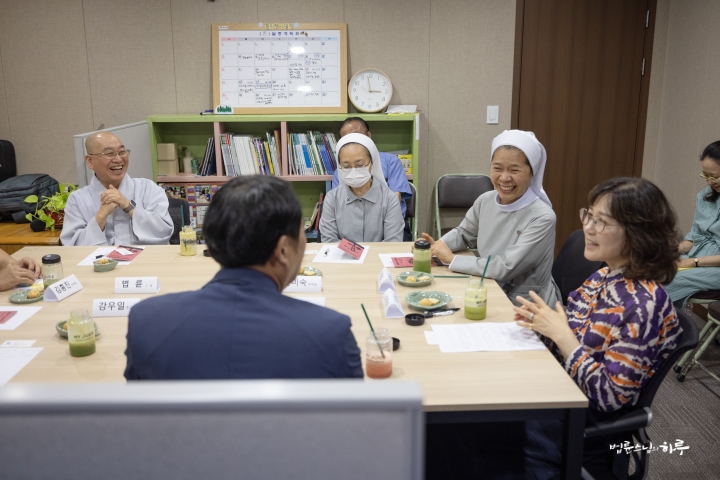
They took a commemorative photo together, pledging to move forward step by step to become warm yet objective helpers for overseas adoptees.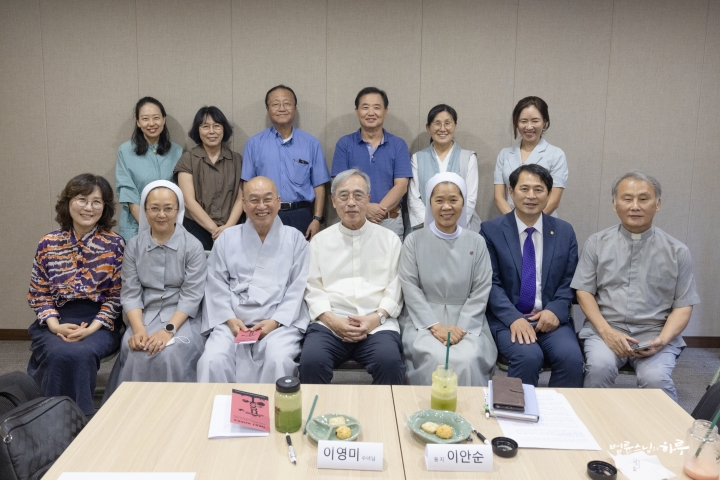
After finishing the advisory committee meeting, Sunim returned to the Jungto Social and Cultural Center.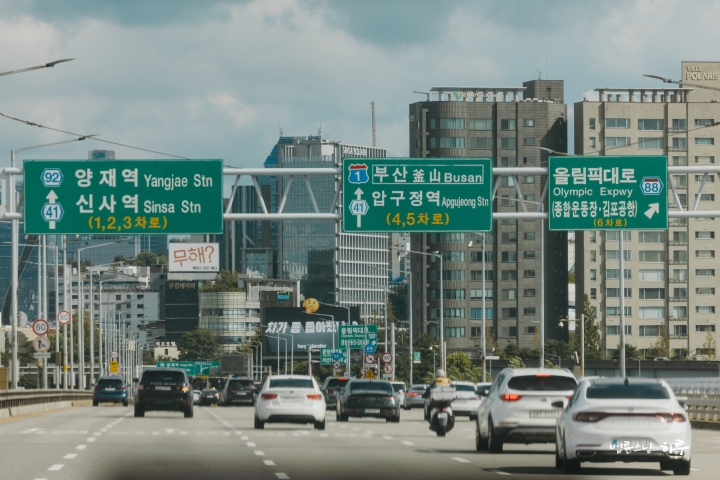
From 4 PM, Professor Park Jin-do, who serves as the chairman of the National Gross Happiness Transformation Forum, visited Sunim for a conversation. Professor Park has been making great efforts to apply Bhutan’s Gross National Happiness (GNH) concept to Korean society, and last year he visited Bhutan with Sunim and provided much advice on sustainable development.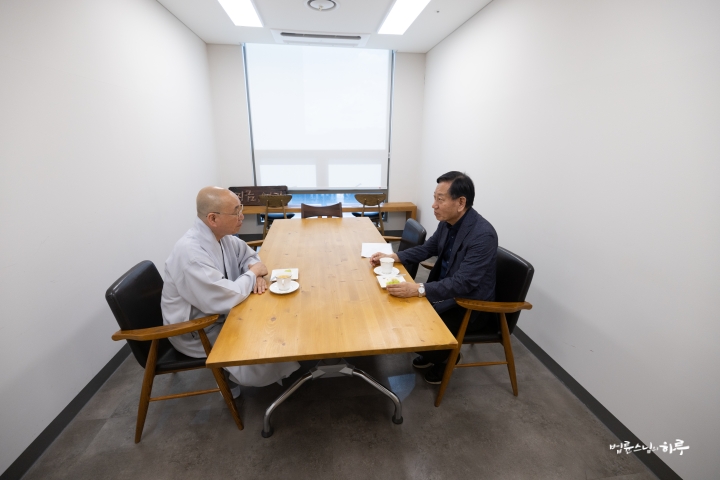
Professor Park mentioned that in the 22nd National Assembly, the ‘National Gross Happiness Policy Forum,’ a group of lawmakers researching GNH policies, would be registered as a research organization and officially launched on the 20th. He requested Sunim’s interest and asked him to give a lecture. They then shared updates on how JTS’s sustainable development projects in Bhutan are progressing and exchanged opinions before concluding the meeting.
Meeting with JTS Volunteers Departing for Bhutan
At 5:30 PM, Sunim held a meeting with JTS volunteers who will be dispatched to Bhutan at the end of August. As the main project for sustainable development in Bhutan begins in September, the JTS volunteers had prepared a draft plan for how to proceed with the work and sought Sunim’s advice.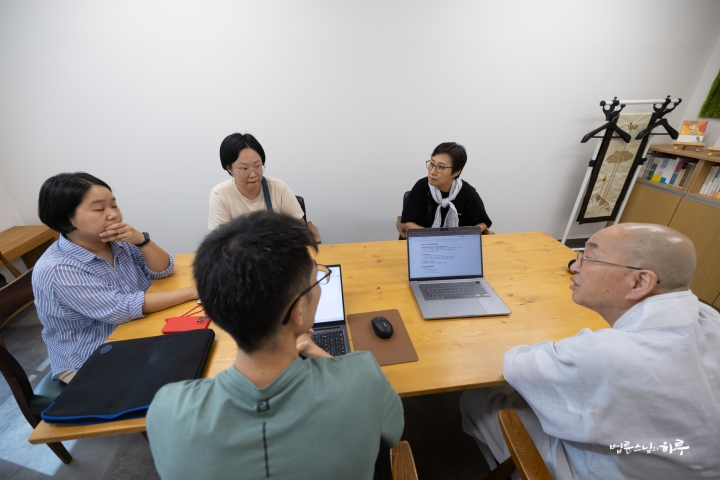
“We’ve planned to start the project in September by dividing into two teams: a sample house construction team and a survey team.”
After listening to the detailed plans for sample house construction and surveys, Sunim shared his opinions.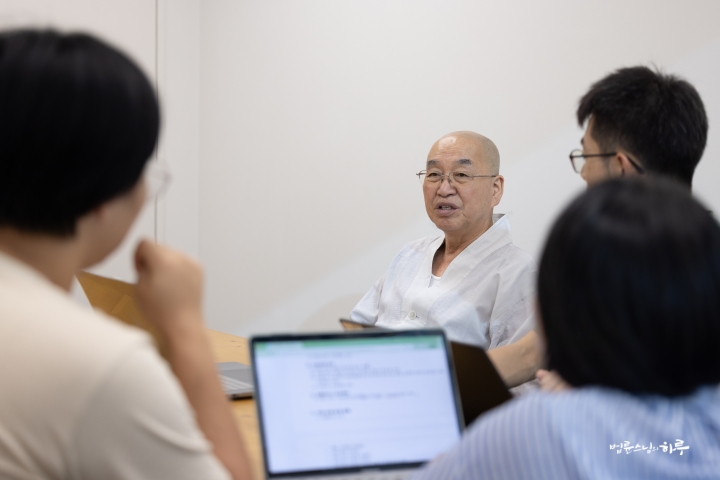
“First, start building sample houses in Goshing Gewog, which is close to your accommodation. In the beginning, you need to gather at the accommodation and have frequent meetings to establish yourselves. Once things stabilize, you can travel to distant villages. You’ll need to do a lot of surveys in September and October, and residents will only be able to participate properly in November after the farming season ends. I’ll visit Bhutan at the end of October, so if there are completed sample houses by then, we can hold completion ceremonies for a few of them. Don’t rush too much. Let’s supplement what’s lacking in the field.”
Sunim encouraged the JTS volunteers who would be working in difficult conditions before concluding the meeting.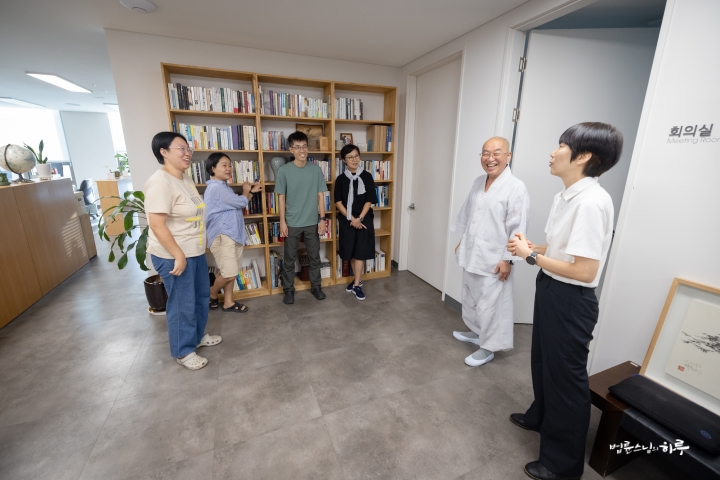
“The day after tomorrow, before you enter Bhutan, let’s have a meal together and talk more. Don’t think of it as too difficult, just approach it lightly.”
After taking a commemorative photo with the JTS volunteers, he offered warm words of encouragement to each person with a gentle smile before wrapping up the meeting.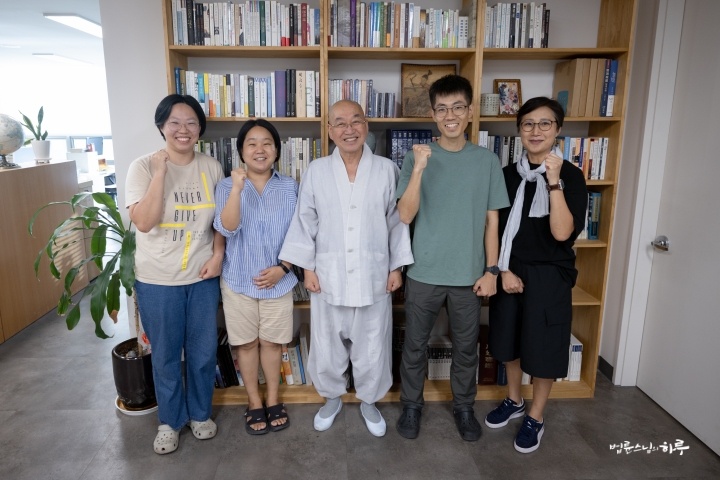
As a guest arrived immediately after, Sunim headed to the basement dining hall.
From 6:30 PM, Sunim had dinner and conversed with the guest. They spent two hours discussing how to improve North Korea-US relations and inter-Korean relations for peace on the Korean Peninsula.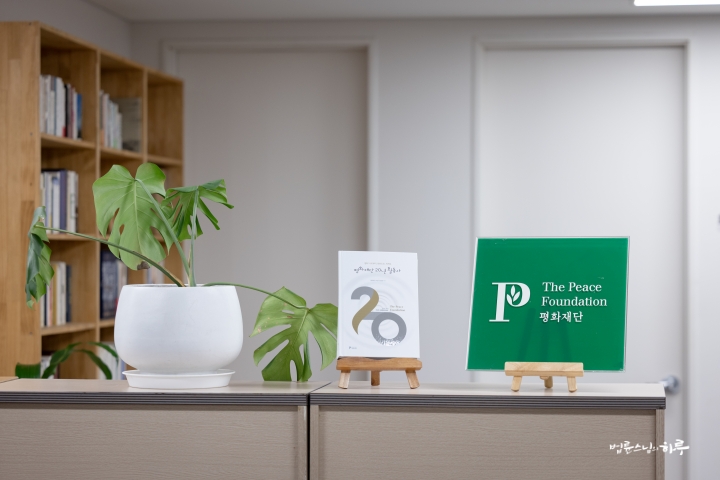
“We’ve decided to hold a Youth Festa event at the Jungto Social and Cultural Center in early November, where 10,000 young people will gather. It would be wonderful if you could make time to share wisdom and concerns about resolving inter-Korean relations with the youth.”
“Yes, I will do that.”
At 9 PM, after seeing off the guest, today’s schedule came to an end.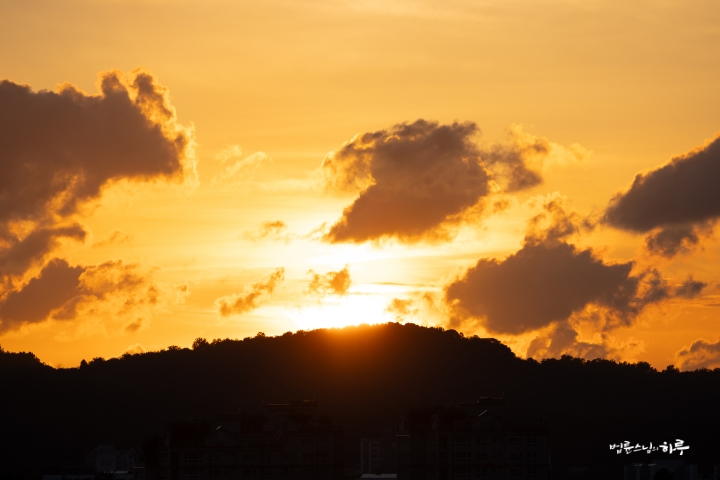
Tomorrow morning, Sunim will attend a religious leaders’ meeting for national reconciliation and peace, then conduct a live broadcast of the Weekly Dharma Assembly for the morning class. In the afternoon, he will participate in a peace research seminar and attend a Peace Foundation planning committee meeting, and in the evening, he will conduct a live broadcast of the Weekly Dharma Assembly for the evening class.
Since there was no Dharma talk today, I’ll conclude by introducing the conversation between Sunim and young people at the Youth Camp held at Seonyudong Education and Training Center on the 15th.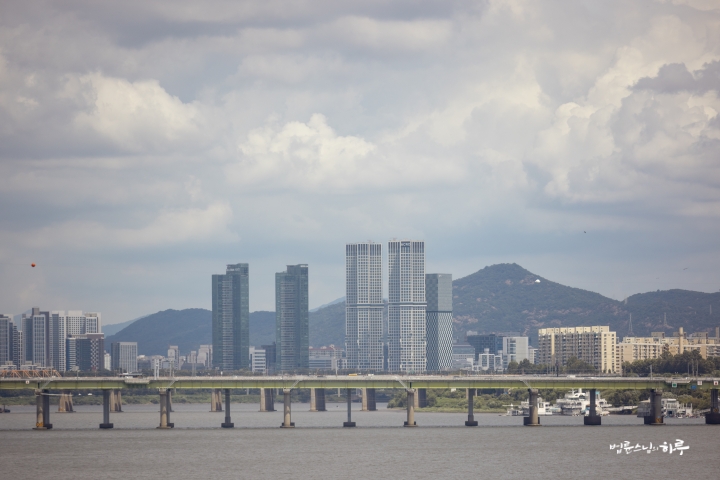
Will Artificial Intelligence Expand Individual Happiness or Deepen Inequality?
“The concerns you mentioned will indeed materialize. However, along with the side effects, various conveniences will also appear. Look at mobile phones. You can’t live without them now, can you? They’ve brought many conveniences, but they’ve also created addiction problems among young people. In the future, when we examine brains, we might discover what side effects come from exposure to mobile phone radiation from childhood. It hasn’t even been 20 years since mobile phones appeared, yet they’ve already become part of our daily lives. I think AI will also become part of daily life in about 10 years. Then there will be a big difference in quality of life between those who use AI and those who don’t. Just as there used to be a difference between those who could read and those who couldn’t, there will inevitably be many differences between those who use AI and those who don’t.
There are two speeds in the development of civilization: the speed at which new things are developed and the speed at which they spread. When development speed is faster than dissemination speed, gaps in civilization occur, and when dissemination speed is faster than development speed, equalization occurs. Currently, both development and dissemination are fast, but perhaps development speed is even faster than dissemination speed. This creates a problem where those developing advance in civilization while those receiving the dissemination fall behind. According to current AI scholars, the United States possesses more than 50% of AI technology, followed by China, with Japan holding some portion, Korea holding a little, and Europe lagging far behind. We often say America is aging, but America still maintains this creativity.
That’s why even if America’s decline comes someday, it cannot easily collapse. If overall new technology development stops and only existing technology spreads, China could catch up quickly. But new technology development is still largely led by the United States. In that sense, there’s a difference of opinion between the claim that ‘America’s era has already peaked and entered decline’ and ‘it will continue a bit longer.’ I’ve also seen America aging in many aspects during my 30 years of visiting, but in terms of creativity, no country can match America yet, so I think America’s era might continue a bit longer.
Has our society fundamentally changed much just because the entire population has used mobile phones for the past 20 years? Not really. Similarly, nothing special will change just because you all use AI. So there’s no need to be too surprised by change. However, many side effects will appear. The side effects you anticipate could actually manifest. But humanity has always gone through such processes. When writing was invented, there was a big difference between those who knew letters and those who didn’t. Also, we were far ahead of China in Bronze Age civilization, but because we were complacent with Bronze Age civilization, we were actually late in universalizing Iron Age civilization. Conversely, because China was late to Bronze Age civilization, they achieved universalization of Iron Age civilization faster. It’s similar nowadays. China is ahead of us in areas like mobile payments and cryptocurrency usage. Also, if you go to places like the Gobi Desert, you can easily see solar panels installed on each tent for electricity, phone charging, and watching television. Solar panel distribution is faster than ours. Like this, those who are ahead become complacent because they’re already using current technology, while those who are behind skip past stages and move ahead by developing new things. Looking at the development of transportation, originally people rode bicycles, then motorcycles, then cars, but Korea skipped motorcycles and went straight to cars. We didn’t go through the motorcycle era like Southeast Asia.
Ultimately, what’s important is how we use AI. We can’t know in detail how changes will actually occur. If side effects appear, we must respond and improve; it’s difficult to respond in advance. Just as we only wore masks and became careful after suffering terribly during the COVID pandemic, we’ll only know how many side effects will appear after experiencing them. We might have tremendous concerns but there might be no significant side effects. That’s why there’s no need to worry too much. However, when gaps arise in technology use, efficiency differs greatly, so capabilities will diverge significantly depending on whether individuals or groups use AI technology or not.
When Jungto Society started in a small rented room, existing temples already had large facilities. Yet, within 30 years, why have these large temples fallen behind Jungto Society? Jungto Society utilized new methods like YouTube and podcasts. However, existing temples didn’t feel the need to make an effort because many people came just by opening their doors, hung lanterns, and made generous donations. But as time passed and elderly devotees passed away, now they can introduce technology with money, but they can’t fill the crucial content. If Jungto Society becomes complacent with its current state, people with new challenges and methods could surpass Jungto Society. Jungto Society could also fall behind if it only relies on SNS.
Don’t worry too much. All the side effects you mentioned will happen. This has always been the case. We experienced it when writing was invented, when iron civilization was discovered, when power engines replaced human and animal labor, and when online digitalization began.
Korea’s recent rapid advancement follows the same pattern. During the Kim Dae-jung administration, when digitalization was promoted nationwide and broadband was installed, Korea skipped stages and reached the world’s highest level first. In the past, Koreans found it convenient when they went to other countries, but now they find it rather inconvenient. So when Korean expatriates living in Germany or the United States complain about their societies, people say, ‘That’s something you’d find in an advanced country. Why would you expect that in Germany?’ The advanced country they’re referring to is Korea. This is how the world has changed. So I think it would be better to observe a little longer.”
“Yes, I’ll think about it neutrally without worrying.”
“Technology inherently has no value and no good or evil. Therefore, technology always brings both efficiency and side effects simultaneously. A gun is good as a weapon, but it kills many people. A knife is good because it’s sharp, but it can also cut your hand. Technology always manifests both sides. What’s important is how users reduce side effects and enhance positive aspects. We cannot completely eliminate side effects. Enhancing positivity is not the work of machines but of people, something we create through our choices and practices. Many of you have become directionally challenged since navigation systems came out, right? If the navigation gives wrong directions, many people would follow them backward. This is because we’ve lost the ability to read terrain ourselves. It’s the same with search engines – if you believe incorrect search results, you’ll end up saying nonsense. If ChatGPT gives you wrong answers, you’ll use wrong answers.
Yet overall, efficiency is increasing. The problem is that we should have more leisure time, but we’re getting busier. The primitive age had the most leisure, and the agricultural age was more leisurely than now. Do you know how people made appointments in the countryside before? When relatives visited and asked ‘When shall we meet next?’ they’d answer ‘Let’s meet next year’ or ‘I’ll come next spring,’ and everyone understood. As time passed, it became ‘Let’s meet next month,’ and nowadays we set specific dates and times to meet. As we live increasingly pressed for time, life has become more convenient, but leisure has disappeared. Convenience doesn’t necessarily mean leisure. We actually do many things we don’t need to do. Trimming and painting nails, wearing earrings and necklaces, caring about clothing design – these are all actions we don’t really need to do. Yet now we spend over 80 percent of our lives on such things. Since we spend money on choosing spices and caring for eyelashes, no matter how much money and time we have, we’re always short and busy. If we let go of some of these things, we’d have more leisure. In fact, if we just wanted to eat and survive, working two hours a day would be enough. But since people can’t live that way, we keep getting busier.
That’s why we need a practice perspective. Without a practice perspective, we’ll be panting until we die. On the surface, it seems better than in the old days, but it’s really not. We’re more bound, busier, and living with more inferiority complexes. In the old class society, servants accepted ‘I am a maid’ and lived with smiles. But now, while we learn about equality, reality is unequal. Life varies greatly depending on who your parents are and what environment you were born into. So suffering inevitably increases. It’s fine if you know it’s unequal from the start, but when you’ve learned it’s equal yet reality is unequal, dissatisfaction grows even more. Therefore, without practice, it’s never easy for humans to live with leisure.”





